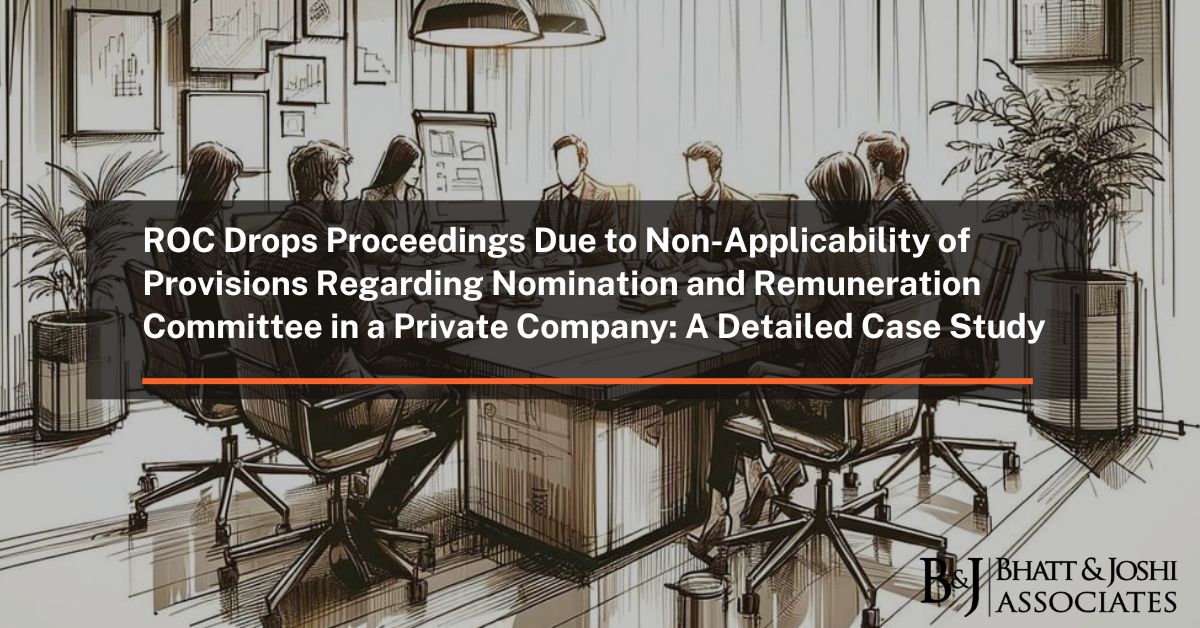Introduction:
In the realm of corporate governance, adherence to regulatory provisions is paramount. The recent case involving the Registrar of Companies (ROC) and M/s Unique Mercantile India Limited sheds light on the complexities surrounding compliance, particularly concerning the constitution of the Nomination and Remuneration Committee. This article delves deeper into the case, examining the relevant legal provisions, the company’s response, and the adjudication officer’s decision, while also exploring the broader implications for corporate governance in private limited companies.
Background of the Case:
The case arose when the ROC initiated adjudication proceedings against M/s Unique Mercantile India Limited for alleged violations related to the constitution of the Nomination and Remuneration Committee, as mandated by the Companies Act 2013. The ROC contended that the company had not complied with the requirement to appoint a committee consisting of non-executive directors, including independent directors. However, Unique Mercantile argued that as a private limited company, it was exempt from these provisions. The case raised fundamental questions about the applicability of regulatory requirements to different types of companies and underscored the need for clarity in corporate governance guidelines.
Relevant Provisions Under the Companies Act 2013:
To understand the case fully, it’s essential to examine the relevant provisions under the Companies Act 2013. Section 178 of the Act mandates the formation of a Nomination and Remuneration Committee for listed companies and certain other classes. The committee’s composition, responsibilities, and functions are outlined in detail, emphasizing the importance of independent directors in the decision-making process. However, the applicability of these provisions to private limited companies remains a point of contention, as private companies are not subject to the same regulatory requirements as their public counterparts.
Details of the Adjudication Order: ROC Allegations and Company’s Defense
Upon conducting an inspection and inquiry, the ROC concluded that Unique Mercantile had failed to constitute a Nomination and Remuneration Committee in accordance with the provisions of the Companies Act 2013. However, the company contested this allegation, arguing that the requirements did not apply during the relevant period when it was still a private limited entity. The ROC’s decision to initiate adjudication proceedings sparked a legal battle that ultimately hinged on the interpretation of the law and the company’s compliance status.
Company’s Response to ROC Allegations
Unique Mercantile vehemently defended its position, citing its status as a private limited company during the financial year in question. The company provided documentary evidence to support its claim and highlighted its disclosure of non-applicability in the board report. Additionally, Unique Mercantile challenged the notice issued to all directors, asserting that only the managing director should be held accountable for any alleged violations. These arguments formed the crux of the company’s defense against the ROC’s allegations.
Presenting Officer’s Analysis:
After reviewing the company’s submissions and documentary evidence, the presenting officer concurred with Unique Mercantile’s interpretation of the law. The officer acknowledged that private limited companies were not obligated to comply with the same provisions as public limited companies regarding the constitution of committees. Furthermore, the officer recognized the company’s proactive approach to governance, as evidenced by its voluntary disclosure in the board report. In a comprehensive assessment of the case, the adjudication officer found no grounds for penalizing Unique Mercantile and its officers. The officer emphasized the company’s status as a private limited entity during the relevant period, highlighting the inapplicability of the provisions regarding the Nomination and Remuneration Committee. As a result, the adjudication officer dropped the proceedings and levied no penalty, affirming Unique Mercantile’s compliance with the law.
Implications and Lessons Learned:
The case of Unique Mercantile India Limited serves as a valuable lesson in corporate governance and regulatory compliance. It underscores the importance of understanding the legal framework governing corporate affairs and the nuances of compliance requirements for different types of companies. Private limited companies must navigate a complex regulatory landscape, balancing statutory obligations with operational realities. While voluntary compliance with best practices is commendable, companies must also assert their rights under the law and challenge any allegations of non-compliance based on sound legal principles.
Conclusion: Unique Mercantile’s ROC Victory
In conclusion, the case represents a significant victory for Unique Mercantile India Limited and a reaffirmation of the principles of corporate governance. By demonstrating its compliance with the law and successfully challenging the ROC’s allegations, the company has set a precedent for other private limited entities facing similar regulatory scrutiny. Moving forward, it is imperative that companies maintain a robust understanding of their legal obligations and take proactive measures to ensure compliance. Through diligent adherence to regulatory requirements and a commitment to good governance practices, companies can mitigate risks and build trust with stakeholders, thereby fostering sustainable growth and development.














